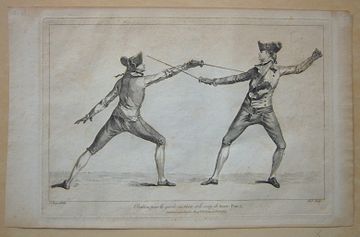Domenico Angelo
This article needs additional citations for verification. (July 2009) |

Domenico Angelo (1717 Leghorn, Italy[1]–1802), was an Italian sword and fencing master, also known as Angelo Domenico Malevolti Tremamondo.
According to the Encyclopædia Britannica, "Angelo was the first to emphasize fencing as a means of developing health, poise, and grace. As a result of his insight and influence, fencing changed from an art of war to a sport." It also calls his treatise, L’École des armes (1763; The School of Fencing) a "classic".[2]
Fencing schools
Soon after arriving in England he established Angelo's School of Arms in Carlisle House, Soho, London.[3] There he taught the aristocracy the fashionable art of Swordsmanship which they had previously had to go the continent to learn, and also set up a riding school in the former rear garden of the house. He was fencing instructor to the Royal Family. One of his tenants at Soho Square was the composer Johann Christian Bach (youngest son of J.S. Bach), harpsichord instructor to the Queen.
With the help of artist Gwyn Delin, he had an instruction book published in England in 1763 which had 25 engraved plates demonstrating classic positions from the old schools of fencing.
He then handed that school over to a son, and established himself at Eton, where his family continued to teach fencing for three more generations.
Family
By his wife Elizabeth Johnson, Angelo had at least six children:
- Henry Charles William, born 5 April 1756. Also a fencing MASTER.
- Florella Sophia, born 1759, Dame at Eton.
- Anne Caroline Eliza, born 1763.
- Catherine Elizabeth, born 1766, married to Mark Drury, Second Master at Harrow school, and brother of Joseph Drury, Headmaster of Harrow.
- Elizabeth Tremamondo, born 1768.
- George Xavier Tremamondo, born 1773.
There was perhaps also a son Michael Angelo.
From him there are 15 new generations of daughters and sons
Death
He died at his daughter Florella's house at Eton.
Legacy
- The play "Tremamondo - The Angel of Fencing", written by Alberto Bona and directed by Giampaolo Zennaro, was staged at the Teatro Carlo Goldoni, in Domenico Angelo's native town of Leghorn.[4]
References
- ^ Swynnerton, C. in Barron, O. (ed) The Ancestor, Number 8 1904 Online at Archive.org
- ^ Domenico Angelo at Encyclopædia Britannica.com.
- ^ F.H.W. Sheppard, ed. Survey of London volume 33 The Parish of St. Anne, Soho (north of Shaftesbury Avenue), London County Council, London: University of London, 1966, pp. 143–48, online at British History Online.
- ^ "Tremamondo, the play (in Italian)".
External links
- Descendants of Angelo Domenico Tremamondo
- Fencers of Fame and Fiction, Margaret Odrowaz-Sypniewski, B.F.A.
- Swynnerton, C. in Barron, O. (ed) The Ancestor, Number 8 1904 (pp 1-73)
